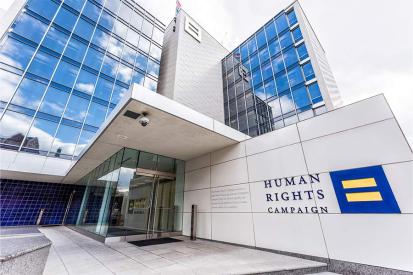What You Need to Know About the Human Rights Campaign


The Human Rights Campaign (HRC) describes itself as “leading the fight for LGBTQ+ rights.” The organization claims to have more than 3 million members and supporters and has been working since 1980.
But there’s a lot more to know about the HRC than those three facts. Here are seven things to remember about this influential group.
1. The HRC supports the so-called ‘Equality Act’
The Human Rights Campaign not only supports the highly partisan Equality Act but has made it a primary objective, featuring the legislation on its website. The Equality Act has not been passed for a reason—it undermines fairness and freedom. Among other things, the Equality Act would create unfair playing fields for women and girls in athletics and education; force women to share private spaces with males; force people who willingly serve everyone to promote messages and celebrate events that conflict with their beliefs; and harm efforts to find loving homes for children in our nation’s overloaded foster-care systems.
2. The HRC takes divisive, vitriolic stands on cultural hot-button issues
In protest of the U.S. Supreme Court’s ruling in Dobbs v. Jackson Women’s Health Organization—which allowed states to protect unborn children from abortion—far-left activist groups reacted by calling for a “summer of outrage,” which the Human Rights Campaign promoted on its site by calling the conservative majority on the Court “a small group of radicals.” Multiple pro-life pregnancy centers were damaged, intimidated, and vandalized by groups promoting the same messaging.
3. The HRC regularly opposes constitutional freedoms in the courtroom
The Human Rights Campaign’s legal work includes opposition to constitutionally protected freedom of speech, bodily privacy in female-only spaces, and parental rights to protect children from undergoing irreversible and unnecessary hormonal and surgical procedures. In fact, one page on the Human Rights Campaign Foundation’s website references multiple Alliance Defending Freedom cases and the HRC’s opposition to our clients.
- Emilee Carpenter Photography v. James
In this case, ADF is defending the rights of wedding photographer Emilee Carpenter to photograph only weddings that are consistent with her views about marriage. The Human Rights Campaign Foundation filed an amicus brief asking the court to rule against Emilee in the case.
- D.N. v. DeSantis
In this case, the Human Rights Campaign on behalf of a male athlete sued the state of Florida over its Fairness in Women’s Sports Act, which protects equal opportunities for female athletes. ADF filed an amicus brief on behalf of our client Selina Soule urging a federal district court to uphold Florida’s law. Thankfully, the court dismissed the critical part of the HRC’s lawsuit in November 2023.
- Boe v. Marshall
In this case, the HRC joined several other activist organizations to sue Alabama on behalf of various plaintiffs over the state’s Vulnerable Child Compassion and Protection Act. The act prohibits the use of puberty blockers, cross-sex hormones, and surgeries on minors to make them appear like the opposite sex. ADF has joined the Alabama Attorney General’s Office to represent the state in protecting children from these harmful, irreversible, and medically unnecessary procedures.
4. The HRC has a track record of internal turmoil
Over the years, the HRC’s internal working environment has been heavily criticized, even by other progressives. An outside consultant reported that HRC staff view the working environment as “judgmental,” “exclusionary,” “sexist,” and “homogenous.” In 2021, the Human Rights Campaign fired its first black president, Alphonso David. David served only for two years before the HRC fired him. He then sued the HRC for racial discrimination.
5. The HRC’s ‘Corporate Equality Index’ (CEI) pushes companies to adopt radical policies
In 2002, the Human Rights Campaign began rating companies on how their policies and practices serve the “LGBTQ” movement. At first, a perfect score on the HRC’s index meant a company held non-discrimination policies and offered health-care benefits to employees’ same-sex partners. Yet, over the years, as more companies complied with these requirements, the HRC ratcheted up its demands. To earn a perfect score of 100 percent and the coveted “Best Place to Work for LGBTQ Equality” title, the HRC is demanding that companies cover “puberty blockers for youth” in their health-care plans.
6. The HRC’s CEI pushes companies to advance radical political agendas through all corporate channels
The CEI grants top scores to companies that take “concrete and dedicated steps to establish and implement comprehensive policies, benefits, and practices” that 1) support “LGBTQ family formation”; 2) extend mandatory health-care options to include “transgender-inclusive” services and treatments; 3) utilize intersectional examination of workplace dynamics through increased focus on employee, supervisor, and executive training and data collection; 4) provide “gender transition” guidelines and other workplace policies for “gender inclusivity,” including dress and bathroom policies; and 5) make “LGBTQ+ health care” resources and services known and readily available to employees.
These must be pursued via advertising, public policy engagement, corporate sponsorships, and more.
7) The HRC’s CEI arbitrarily assigns or removes points from ranked companies.
To avoid losing 25 points, companies must not make “charitable contributions … to organizations whose primary mission includes advocacy against LGBTQ+ equality.” As interpreted by HRC, many churches fit that description, as do countless religious organizations, nonprofits, and small businesses that engage in social activity or advocacy according to their religious beliefs about marriage and human sexuality.
Conclusion
The Human Rights Campaign isn’t just a flawed organization; it’s a leading advocate of unjust causes in the courtroom, legislature, and public square. It takes divisive stances, makes radical demands of corporations, and has a track record of internal turmoil. It’s beyond time we recognized the HRC for what it is.
